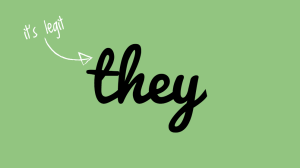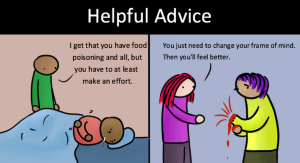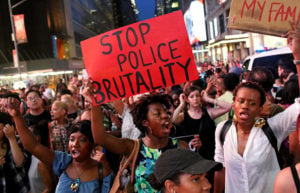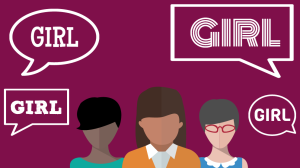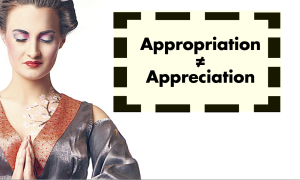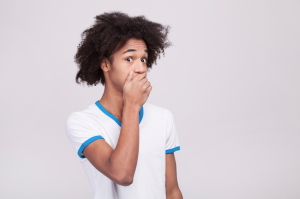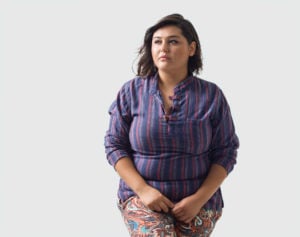
A fat person stands, looking uncomfortable and gazing uncertainly off to the side.
(Content Notes: eating disorder, online harassment, mentions of encouragements of suicide, anti-fat slurs)
On April 1, 2015, my cell phone suddenly became flooded with text messages that I presumed, at the time, to be spam.
I don’t mean, like, a few annoying texts here and there throughout the week – this was nothing remotely reminiscent of the emoji narratives your drunken ex might send after a long night at the bar.
I’m talking thousands of illegible messages per minute, with follow-through links and incomprehensible gibberish akin to Word font options consisting purely of symbols. My device would beep uncontrollably every couple of seconds, so trying to delete the texts proved pretty much futile.
I took my cell to the Mac store later in the day, concerned that the phone would set itself on fire if the texting continued. “It might be a virus,” the tech rep told me. “Have you watched any illegal videos on it?”
I hadn’t, and he looked as puzzled as I felt.
A few hours later, similar messages started coming into my e-mail addresses: my work account, my personal account, an old account I hadn’t used in years, and an address I reserved purely for online shopping.
Although the rate of e-mails per second wasn’t quite as threatening, I started to feel somehow targeted, the victim of a bizarre April Fool’s Day joke, perhaps.
This lasted about 24 hours, with a few sporadic e-mails and texts coming through in the days that followed. I worried less and less, though, telling myself that I must have accidentally subscribed to some kind of sketchy listserv.
That is, until my bank account was hacked later in the week.
When I signed onto online banking to check my finances, I noticed a couple thousand dollars’ worth of shoe purchases had sent me into serious overdraft territories. I looked down at my feet, my beloved three-year-old Dr. Marten boots worn and tatty. As much as I could appreciate some artfully crafted footwear, I had never indulged my sartorial fancies quite to that degree.
The bank actually called me before I got the chance to ring them: The fraud department had picked up on the charges and was aware that something suspicious was going down. I had my card with me. It hadn’t been stolen.
But nonetheless, someone had the information and was using it. The bank was (luckily) able to return the money within a week, and I was sent a new card.
I thought very little of these experiences over the next several months, chalking them all up to a bad week in the never-boring metropolis that is New York City.
Although a colleague asked me if I thought it all might be tied to my work as a fat-positive writer and advocate of size acceptance, I brushed her off. Trolls had never bothered me beyond the scope of social media and pavement bullying.
But in January of this year, the texts started coming in again.
At one point, my phone seemed to be hacked before my eyes: Someone assuming control of the screen and navigating through the icons without my touching it at all. The same week, the trolling I was experiencing online felt particularly grave – more requests that I kill myself were meeting my e-mail inbox than usual.
My partner did what any anxious millennial might do in this scenario: He turned to Google. He searched the deepest pits of cyberspace for my name and information, eventually coming across a “Marie Southard Ospina” section on a doxing site.
Doxing is an extreme form of online harassment, whereby your personal details are published with the intent of seriously fucking up your life.
Under my name were my e-mail addresses, my phone number, details of everywhere I had ever lived, my partner’s family’s hometown, the address of the home where I was raised and where my single mother still lives today.
Beneath every name on the site was also a “reason” for their presence. These included “gay,” “feminist,” “feminazi,” “liberal,” and “dyke,” among others. My reason was, simply, “fat.”
Because the website also seemed to track and obtain IP addresses of unauthorized computers accessing it, we logged off quickly and sought reinforcement. Police couldn’t tell me how to get my information removed, though. I’d have to invest in an expensive lawyer with a focus on web-crime – though tracking the origins of the doxing would be nearly impossible, they said.
One thing I could do was change my legal name. My writing and social media presence could thus remain separate to the information linked to my home address, billing statements, license, passport, and so on. I started by changing my phone number, although a name change is still something I think about doing, too.
My deputy editor at the site I worked for connected me to Brianna Wu, a video game developer who suffered through serious doxing for, essentially, being a woman in a man’s field.
She’d been through much of the same, and worse. She hadn’t let it hinder her career or presence in gaming, but she understood the urge I was feeling to shut down, quit social media, and stop writing about fat people.
I did take a break from writing for a while, feeling lucky to work at a progressive feminist company with bosses who were understanding. But then I missed it.
I missed the connection to fellow fats. I missed hearing from teenagers who were struggling with their own body image and felt they could talk to me about it. I missed feeling unapologetic in my body. I missed my pre-doxing self.
So then I started up again, all the while reflecting on everything the experience taught me about being a fat person: what it means, how people will react to you, how it can feel.
Being doxed reminded me of the capacity humans have for inflicting unnecessary pain, yes. But it also taught me the following about my fat life.
1. My Existence Will Always Bother Some People
Whenever I step out into the world in a bikini or crop top or anything that doesn’t hide my fatness, I’m aware that the sight of my body will be enough to make some folks feel uneasy.
This might manifest in judgmental, but silent gazes from across the street. It might manifest in being called a “cow” or “pig” or “donkey” by a group of people on the subway. It might result in someone screaming, “Get diabetes,” if I dare eat a sweet treat while sporting something that shows off my cellulite.
And when I post a photo of myself onto the Internet, clad in a galaxy-print bikini or a shirt that reads, “I’m Morbidly Obsessed with Myself,” the reality that so many people are bothered by my existence becomes all the more evident.
Behind a screen, more humans feel able to spew vitriol to no repercussions.
They can tell me to kill myself, condemn me for allegedly encouraging all of the world’s children to be fat, and Photoshop my image to make it appear fatter or thinner, depending on the message they want to convey.
Some folks are so conditioned to view fatness as something evocative of disgust and contempt that their cruelty will hit you like family-sized bag of M&Ms right in the face. Because you are fat, they will deem you worthy of shame – and they won’t hide their feelings.
When such displays of prejudicial thinking rear their ugly heads, I believe it’s crucial to remind yourself that you are not hurting anybody.
It is not your existence that is the problem. It’s the stereotyping and cruelty and malice inflicted on a part of your identity that someone has deemed inferior.
Being doxed proved, to me, that my existence is indeed enough to rub some people the wrong way. Much like, as evident through the “reasons” listed on this particular doxing website, are the existences of gay, liberal, and feminist individuals.
At the end of the day, however, my identity as a fat person isn’t causing physical harm unto anyone. The prejudices of intolerant people, however, have the potential to cause quite a lot of pain.
2. Anyone Who Doesn’t Believe in Size Discrimination Needs to Reevaluate
One of the most common critiques I receive regarding my work is that “size discrimination isn’t real.” It’s an ideology further fueled when information comes out regarding weight not being a “protected class” in states like New York.
As Kevin Mintzer, a Manhattan-based attorney who specializes in sexual harassment and discrimination claims, told Bustle’s Amanda Richards, “A protected class means that you can’t discriminate on that basis – gender, race, sexual orientation, disability, those are all protected categories under New York law.”
In other words, your boss or anyone else could be allowed to legally shame you for your size, arguably because this kind of discrimination isn’t deemed a “real” enough problem.
Anyone with a shred of logic and compassion can probably put two and two together when yet another fat person comes forward to divulge the harsh shaming and intolerance they have endured for their body.
When a photo of plus size women in bikinis is removed from social media for breaking nudity guidelines, even when the same rules don’t often apply to thin bodies; when we learn that being fat can mean you are at a risk of reduced medical care or increased conviction rates; when Facebook pages with a focus on Photoshopping the bodies of fat people for mockery come into existence.
So I would like to trust that most people could look at my experience with doxing, read about my “reason” for being targeted, and arrive at the conclusion that the people responsible for this were garbage, and inarguably coming after me for my body type.
And yet, I don’t doubt that many wouldn’t.
Instead, they’d call size discrimination “just another thing people today are easily offended by,” and proof that we should all just be better at “sucking it up.” Or maybe they’d suggest that I lose the weight if I “don’t want to be bullied.”
3. Being a Visible Fat Person Online Can Be Dangerous
There’s a reason that a lot of fat individuals don’t post their e-mail addresses on their blogs or Twitter bios. There’s a reason that a lot of us don’t share full-body photos on our social media pages.
Usually, the goal probably isn’t to “trick you” or convince you that we are, actually, thinner than we appear. Rather, we’ve likely learned that staying in the shadows and shrinking (our personalities and waist sizes alike) is one way to guarantee self-preservation.
Harassment targeted at fat people isn’t inescapable in real life. But as with most forms of harassment, something about the Internet seems to give people a free pass to be their worst selves.
When my image was stolen by Project Harpoon – one of these Facebook groups specializing in fat-people-shaming – and Photoshopped to make my body appear thinner, I remember feeling violated. The image looked so much like a younger version of myself, one riddled with an eating disorder and growing physically more unhealthy by the day.
I knew I was healthier now, as a fat person. I knew I was happier now, too. And yet, my mental health suffered at the reminder of the sheer lack of respect and humanity designated to fat humans.
When my private information was leaked publicly – my mom’s home address shared, my phone number given away – it wasn’t just the wellbeing of my mental health that came into play.
I worried about my safety. I worried about my mom’s safety. I worried that someone would show up at her door and hurt her. I worried that someone would set my home on fire. I worried that she or I would be threatened with sexual assault.
It wasn’t paranoia: It was just a series of reflections based on collected anecdotes. I knew this kind of shit happened, I knew plenty of people whom it had happened to.
And I knew that my presence on the doxing website meant that my body was reason enough, in many people’s eyes, for it to happen to me, too.
4. Being a Visible Fat Person Online Is So, So Important
Even though it can be scary at times, there’s no doubt in my mind post-doxing that being a visible, unapologetic fat person on the Internet is hugely important.
There will, most likely, always be folks out there trying to tell us to STFU – to go back to our burritos and allow the advancement of homogenous aspirational beauty narratives to continue to dominate the world.
It’s people such as these that contribute to the fat-shaming so ingrained in society at large – the kind we see on television, in cinema, in glossy magazines.
But there will always be more people who need your voice.
There will be fellow fats who don’t realize that they are free to live their lives to the fullest at this very moment, no so-called body transformation required.
There will be women and femmes who haven’t felt bold enough to rock the hell out of a tight dress – visible belly outline on show – until they see the many glorious fatshion bloggers of the world slaying on Instagram in similarly tight dresses.
There will be those who’ve been taught to believe that shrinking physically is the only route to an existence free from self-body shaming. And there will be many you can help.
***
If not for the myriad of proud fatties of the Internet wearing their bikinis, calling out prejudice, and dedicating so much of their lives to educating the masses and fighting fatphobia, my own life-trajectory would’ve been entirely different.
I don’t know that I would’ve overcome an eating disorder. I don’t know that I would’ve allowed myself to experience the many magical aspects of sex and intimacy. I don’t know that I ever would’ve worn clothes that actually made me smile. I don’t know that I ever would’ve learned to like myself all that much.
I almost listened to the doxers: I almost stopped writing out of fear and anger. I wouldn’t have judged anyone who chose that route, because it’s horrifying AF to be in such a position.
But if there’s one thing being doxed taught me, it’s that my role as a fat person who loves their body and publicly rambles about their wobbly bits often is one that has value.
And so are the roles of all my fellow fats: the ones who refuse to shrink – in size, in presence, in loudness, in voice, in gravitas – each day.
[do_widget id=’text-101′]
Marie (otherwise known as Miggle) Southard Ospina is a Contributing Writer for Everyday Feminism. She is a freelance journalist and size acceptance activist. Her loves include: writing about plus size fashion, body politics, and fat positivism; watching a lot of sci-fi; and listening to ungodly amounts of folk music. She can be found discussing body image on Good Morning America and StyleLikeU, with writings on Bustle, Refinery29, BuzzFeed, Huffington Post, and Volup2.
Search our 3000+ articles!
Read our articles about:
Our online racial justice training
Used by hundreds of universities, non-profits, and businesses.
Click to learn more











